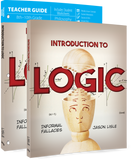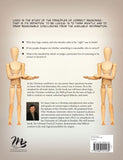Introduction to Logic Set
Welcome to the world of logic. This logic course will both challenge and inspire high school students to be able to defend their faith against atheists and skeptics alike.
Because learning logical terms and principles is often like learning a foreign language, the course has been developed to help students of logic learn the practical understanding of logical arguments. To make the course content easier to grasp, the schedule provides worksheets and practice sheets to help students better recognize logical fallacies, as well as review weeks for the quizzes and the final.
Another way to help understand and memorize new terms is by creating flash cards or memorization cards. It should be noted that this is a part of nearly every week of study on the schedule provided. Students can make their own flashcards on 3 x 5 cards (the term on one side and the definition on the other), or they might find a flashcard app that can be used from a phone or computer.
Logic is the study of the way God thinks. So, by studying logic, you are actually doing theology! This is a great point to emphasize for students who fancy themselves theologians, but are not terribly excited about logic. Students planning on going into ministry better learn something about the mind of the God they serve. Students of science better learn something about God’s mind since it is God’s mind that controls every atom in the universe. Knowing how their Creator thinks will give them an edge over secular students. Emphasize how awesome it is that we are learning about God’s mind! It would be wonderful to learn how Leonardo da Vinci’s mind worked, or Albert Einstein’s. How much more awesome to learn about the mind of God!
Studies have shown that students learn far more effectively and retain information better if they are exposed to it in short bursts over a long period of time rather than in a long burst of short duration. The student who studies a topic for 40 hours in one week will not retain it nearly as well in long term memory as a student who studies for a total of 40 hours spread out over two months. For this reason, it is helpful to occasionally ask the student to recall information learned in previous chapters. This reinforces the topic, helps with memorization, and may help the student to think about the older material in light of the newer material. For these reasons and more, we stop and review fallacies covered in previous chapters.
- A full-year course that will increase a student’s ability to refute the untruths that evolutionists claim as fact.
- Includes both a student text and a teacher’s guide with all necessary quizzes and tests.
- Teaches methods that are reliable and effective in defending truth.
By Dr. Jason Lisle
192 pg. paperback book
157 pg. paperback Teacher Guide
Table of Contents
- 1. Logic and the Christian Worldview
- 2. All Knowledge Is Ultimately from God
- 3. Why Study Logic?
- 4. Propositions and Arguments
- 5. Inductive and Deductive Reasoning
- 6. The Biblical Basis for the Laws of Logic
- 7. Logical Failure of the Unbiblical Worldview
- 8. Is the Christian Faith Illogical?
- 9. Is Faith Contrary to Reason?
- 10. Arbitrariness and Inconsistency
- 11. Definitions
- 12. A Brief Introduction to Syllogisms
- 13. Enthymemes
- 14. Informal Logical Fallacies
- 15. Equivocation
- 16. Reification
- 17. The Fallacy of Accent
- 18. The Fallacies of Composition and Division
- 19. Hasty Generalization and Sweeping Generalization
- 20. The Fallacy of False Cause
- 21. Begging the Question
- 22. Begging the Question — Part 2
- 23. The Question-Begging Epithet
- 24. The Complex Question
- 25. The Bifurcation Fallacy
- 26. The No True Scotsman Fallacy
- 27. Special Pleading
- 28. The False Analogy and the Slippery Slope Fallacy
- 29. Review of the Fallacies of Presumption
- 30. Ad Hominem
- 31. The Faulty Appeal to Authority
- 32. The StrawMan Fallacy
- 33. Faulty Appeals
- 34. Naturalistic, Moralistic, and the Appeal to Consequences
- 35. The Genetic Fallacy and the Tu Quoque Fallacy
- 36. The Fallacy of Irrelevant Thesis
- 37. Review of Fallacies of Relevance
- 38. Closing Remarks
- Glossary/Index
- Informal Fallacies at a Glance
- Quick Reference Guide











